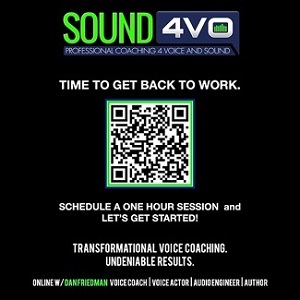|
VOICE OVER MARKETING / PART 1: Don't Dread Cold Calling! Here's A Step-By-Step Guide To Successful VO Cold Call Marketing  By Rob Marley By Rob MarleyVoice Actor & Author Note: This chapter excerpt is reprinted with grateful permission from the author's new book, "So You Want to Do VO? Working from home as a voiceover actor," - a step-by-step guide to success in the voiceover industry, available here at
Amazon. OK, so you've scoured the internet and found the
name of a production company that uses voiceover talent. Now comes the part of
this adventure that lies between the pit of man's fears, and the summit of his
knowledge. The two words that strike dread
into the hearts of even experienced sales people: COLD CALL.
This is where the rubber hits the road. This is
where you take off the voice artist cap, strap on the salesperson helmet, and
charge onto the battlefield. And like it or not, even in this modern age of
social networking, this old-school way of converting a lead into a client is
still used as the first step in making a successful connection for a lot of
professionals. So the sooner you get used to this, the greater your success
will be.
MAKE IT QUICK
Email can easily be ignored, but a conversation
with a real human being can make the difference between getting the job and
never hearing from them.
The purpose of a cold call
is to inform the individual
that does the hiring
that you exist.
Beyond that is open for negotiation.
The trick to the cold call is to make it quick.
That means you need to have a clearly laid out objective for the call before
you start tapping the numbers. Visualize your end result and work backwards. TO DO THAT ... Ultimately, you want to convert the lead
into a client that uses you for projects on a regular basis. To have that happen, you first need to
get them to hire you for a single project. To do that, you need to convince them
that you've got the vocal chops. And to do THAT, you need to get them to
listen to your demo.
START HERE ... So for your initial first contact with a lead,
your objective is to get them to accept your demo by giving you their email
address. That's it. It's not a big sales pitch, or a 10 minute job interview.
Get on, make a connection, get an email address and get off.
Here are some tips to keep in mind:
1. Do some research about the company before
you call them. The business website is usually a great place to start. If it's
a production company, look up their past work. What kind of productions do they
specialize in? Is this your genre of VO? What style of delivery do they tend to
use? Is this something you can do?
2. Do some research about who you need to
talk to. In most production companies, advertising, and marketing agencies,
that's going to be the Creative Director. They are the ones that coordinate all
aspects of a production - including hiring the voiceover talent. But make sure. Does this business call that person a Creative Director? Maybe they call that
position the Production Manager. Or the Executive Producer. Or maybe they don't
really have a title for that guy. Either way, try to find out ahead of time.
3. Timing is everything. A study of
business-to-business sales calls published in the Harvard Business Review found
that calls made between 4 and 5 pm had a 164% better connection rate than calls
made between 1 and 2 pm. They also found that calls made on a Thursday had more
connections than any other day of the week.
4. Script it out. When you're first
starting out, it's nice to have a script in front of you to help stay on track. However, this shouldn't be something that makes you sound like you're reading.
We've all had those kinds of sales calls. They are the worst. Instead, use the
script just as a way to stay on target. Use bullet points for the majority of
what you're going to say. Script out sentences if it helps you remember. After
a few calls, you probably won't need the script, anyway.
5. Smile and dial. As a voice artist, you
probably already know that smiling while delivering your lines will come through
in your voice. It's a technique you hear all the time in commercial copy. Subconsciously, a smile can induce a positive feeling in the other person.
Psychologically, this is a subtle way to program someone's mind into
associating a pleasant feeling when hearing your voice. 6. Keep a notepad with a pen ready. You'll want to jot
down the name of the receptionist, the name of the person you're trying to
contact, and the email address when he gives it to you, etc.
PRO TIP: Do not call the businesses' 800 number!
If there are two numbers listed on the company's website, use the number that
is local to them. The business pays for every call that comes in on an 800
number. Ask yourself: would YOU hire someone who just made you pay $.05 per
minute to take their call? This is also important to remember when contacting a business through a cold
email. If you found that company through an ad you saw, they are going to know
it. To them, you just cost them money that they paid out to find a business
client. NEVER click on a potential client's advertising. EVER. Instead, do a
search for the business name on your own. NOW SMILE AND DIAL ...
OK, so you've done your due diligence, you know
the name of the person you need to talk to (or at least their title), and you've
got a goal in mind for this call.
Find a quiet room (use a headset microphone if
you have access to a quality one), take a deep breath and dial the number.
You are ready to begin the adventure. Breathe. It
will be OK.
The first person you're going to encounter on
this adventure is the gatekeeper. Oh sure, they may be called a "receptionist"
or "executive assistant" or something, but make no mistake: they're the
gatekeeper. THE GATEKEEPER & BEYOND You want the gatekeeper to remember you in a positive way. If you
annoy them, you'll soon find that the person you're trying to contact always
seems to be unavailable.
What you say here is very important. From the
moment your first words are spoken, the gatekeeper is carefully analyzing the
audio and determining if you are a genuine business contact or someone just
trying to sell something (and we all know how we handle people trying to sell
us something) .
In a friendly, and unforced tone, say hello and
ask if you could speak to the person in charge of hiring voiceover talent.
If you get connected, introduce yourself:
If you've contacted the right person at the
company, chances are they will say "Sure, send me your demo" or something
along those lines. You could also ask if they prefer attachments or links in their emails. Some
companies are set up to automatically delete an incoming email with an
attachment. Be sure to find out which way they would prefer it (and if they
say yes to an attachment, send a link as well in the signature section of your
email). Ask if it's OK to contact them in a few weeks as
a follow up. Sometimes they will say yes, or suggest a better time frame to
contact them. Make a note of this on your notepad.
Thank them for their time and get off the phone.
IF YOU'RE SENT TO VOICEMAIL ... What if you get
voicemail?
Voicemail can be another level of complexity that
can trip you up. What you say directly to someone and what you say on a
voicemail are usually two different things. When I first started cold calling I
left some voicemails that were ... wow. I still cringe thinking about them.
Nerves get the better of you and before you know it, you've handed a potential
client a big bag of verbal vomit.
Solution: Have something prepared in your head
while you're waiting for the beep. Tell them that you just wanted to see if they
were accepting demos from voice talent. Leave your name and phone number or
email address (if it's professional), thank them and hang up.
Why do I say leave your email address only if
it's professional? Because saying "Joe Blow VO at Gmail dot com" paints you as
a base amateur. Would a production company that works with million dollar
commercial budgets trust their reputation to some guy they've never heard of
who wasn't professional enough to buy a stupid domain name?
Enough said.
NOW KEEP DIALING Congratulations! You just completed your first
cold call!
Now go do 5,000 more.
The more you cold call, the more comfortable
you'll get at knowing what to say and how to say it.
Most people feel like they're intruding on
someone's time. But you have to remember that if you do it right, you're not
intruding, you're contacting a business and offering a service that they
already use -.and just might be in need of at that particular moment. Sometimes just calling at the right time is
all it takes.
-------------------- ABOUT ROB
Rob Marley is a full-time voiceover artist,
coach, producer and author, living in the hill country of Austin Tx. His
book, "So You Want To Do VO? Working from home as a voiceover actor" can be
found here at Amazon.com. Web: www.MarleyAudio.com |
|
|
Tell Us What YOU Think!
Please Note: Since we check for spam, there will be a slight delay in the actual posting of your comment.
Comments (1)
Ryan Duncan
2/25/2021 at 7:26 PM
This is gold. Thanks for posting, Rob.






.png)



click for new article alerts